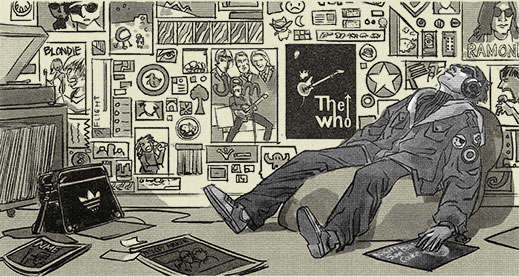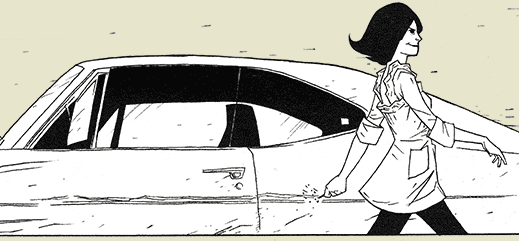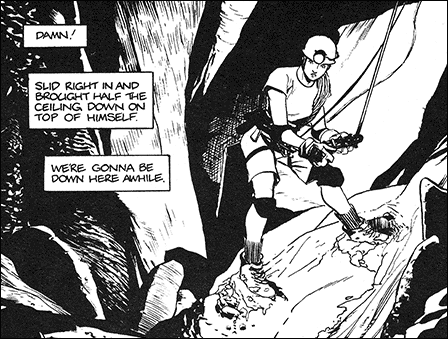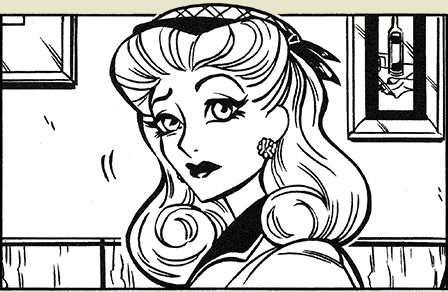Four Letter Worlds
Created by: Eric Stevenson, Steven Griffen, and Chynna Clugston
Published by: PUBLISHER
ISBN: 1582404399 Amazon
Pages: 144



I should really stop reviewing anthologies. While the specifics will vary, my final analysis will almost certainly be the same as the last time. And the time before that. Ad infinitum ad nauseum et cetera forever and ever amen. With exceptions that are exceptional, an anthology is going to be Alright. It's going to have a number of Good stories (perhaps some will be Very Good) and a bunch that are Just Okay and are probably only there to pad out the book's length, and then maybe one or two that are Just Bad, stories that you're not sure a) why they were written in the first place and b) how an editor let them into a collection that they might want readers to enjoy. That is the make-up of almost every anthology I've read.
Of course, there are exceptions: the books that are really just mostly bad with only a couple mediocre stories to lift them from outright destitution and the far more uncommon books that are just a pile of storytelling goodness. Four Letter Worlds is neither of these and instead plays perfectly to type.
The book's organizational conceit is worthwhile. The collection holds sixteen stories (each with a four-letter title) and these are divided into four groups of four. Each group is themed around one of four four-letter words. (Literally, not euphemistically.) These are Love, Hate, Fear, and Fate. And each quarter has at least one good story and at least a couple that hit the so-so-and-lower range. Rather than focus on all the negativity, I'll hit the highlights in each farthing and try to keep cheerful.
Love
LOVE's opener is its best effort and may even be tied for the anthology's best as well. "Spin" (written by B. Clay Moore; art by Steve Griffen) is a pitch-perfect story of love and loss explored through a single record's ownership. I don't know these characters and their subculture is foreign to me, but I understood them entirely. Moore and Griffen speak across gulfs of age, gender, creed, and taste as they follow a rather clueless music lover through the lifespan of a relationship. The particulars of their narrative thread are unimportant; the evocation of the common experience is everything. Plus it helps that I love Sam Cooke.

LOVE holds one other good story. It's not as powerful and may even be a little too cute, but Jeff Parker's addition, "Bear," is a little bit charming and as one comes to see it for what it is, recognition humps nostalgia and the reader comes away satisfied. The story mostly turns on that moment of realization, so subsequent readings won't likely find much meat beyond that initial thrill. Which is fine—those stories have their place and purpose.
Hate
HATE also has two good stories. "Junk" (written by Eric Stephenson; art by Mike Norton) examines the character-changing reality that divorce exerts on normally sane people. The story very much resembles a scene from Before Sunrise in that there is no action outside a couple walking from one place to another. The whole strength of the story lies in its conversational nature.
J. Torres and John Bernales provide the other worthwhile bit in HATE, a small tale that comes in the form of anecdote. Whether fictional or non, "Cool" feels real. It has that half-polluted experience of memory by which we call to mind important, earth-shattering, paradigm-shifting moments and get everything wrong while still getting the most important thing right. "Cool" isn't the story I'll remember a year from now when the book comes to mind, but I was glad it joined the package and the book is better for its inclusion.

Fear
FEAR is the weakest quarter of the collection. There was only one story I liked and even that wasn't a very strong addition. Even though I could appreciate the sentiment and experiment of Scott Morse's "Mano," it was Steve Lieber's "Fell" that I thought best accomplished the task of helping me want to keep reading. There wasn't really much special about Lieber's story of a rescue-caver getting pooped on (did I read that right?), but it was well-paced and a little funny (did I mention getting pooped on?).

Fate
While I earlier said that LOVE's "Spin" was probably the best story of the collection (and it probably is), my favourite would have to be Chynna Clugston's "Anew." I am, incurably, a romantic and stories that scratch that itch without devolving into trite sentimentalism or contrived pap will always stoke the fires of my enjoyment (note my earlier mention of and unmentioned adoration for Before Sunrise). The first story in FATE, Clugston's diner-set tête-à-tête shows her typical strength for building relationship drama in a manner sweet yet not cloying. It's only too bad that Clugston's story was not posted last in the anthology for then it would have gone out with a bang instead of the whimper we get.

While I've certainly read worse collections, that's really not a great recommendation for any published work. Some of these stories are certainly worth your time, but whether five or six decent-to-good shorts are worth thirteen bucks to you? That's something you can take up in argument with your anthropomorphized wallet.
Good Ok Bad features reviews of comics, graphic novels, manga, et cetera using a rare and auspicious three-star rating system. Point systems are notoriously fiddly, so here it's been pared down to three simple possibilities:
3 Stars = Good
2 Stars = Ok
1 Star = Bad
I am Seth T. Hahne and these are my reviews.
Browse Reviews By
Other Features
- Best Books of the Year:
- Top 50 of 2024
- Top 50 of 2023
- Top 100 of 2020-22
- Top 75 of 2019
- Top 50 of 2018
- Top 75 of 2017
- Top 75 of 2016
- Top 75 of 2015
- Top 75 of 2014
- Top 35 of 2013
- Top 25 of 2012
- Top 10 of 2011
- Popular Sections:
- All-Time Top 500
- All the Boardgames I've Played
- All the Anime Series I've Seen
- All the Animated Films I've Seen
- Top 75 by Female Creators
- Kids Recommendations
- What I Read: A Reading Log
- Other Features:
- Bookclub Study Guides









